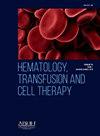Validation of an automated quality control method to test sterility of two advanced therapy medicinal products: Mesenchymal stromal cells and their extracellular vesicles
IF 1.8
Q3 HEMATOLOGY
引用次数: 0
Abstract
Mesenchymal stromal cells are multipotent cells present in various tissues that are widely studied for relevant therapeutic potential due to their paracrine immunomodulatory and tissue regenerating properties. Many mesenchymal stromal cell-based products are under investigation for the treatment of different clinical conditions. Recently, the therapeutic potential of the extracellular vesicles released by these cells has been under focus, with emphasis on clinical translation. Sterility testing during manufacture and before the final release of the advanced therapy medicinal products to markets is a critical quality control measure. Therefore, analytical methods for sterility testing in addition to complying with pharmacopeial standards must validate the adequacy of each product and evaluate matrix interference. Here, an automated system for sterility control of reagents used in the bioprocessing of mesenchymal stromal cells and their extracellular vesicles was validated. Reagents (culture media, antibiotics, and excipients in the final product) were inoculated with 10 or 50 colony forming units of microorganisms in BACTEC™ Peds Plus™ T/F aerobic/anaerobic bottles. Under aerobic conditions (BACTEC™ Peds Plus™ T/F aerobic bottles), microbial growth was detected within an acceptable incubation time according to regulatory guidelines. The results of this study corroborate other studies that use automated sterility testing as an alternative to the manual USP<71> compendial method to detect microorganisms close to the limit of detection within an acceptable incubation time.
两种先进治疗药物间充质基质细胞及其细胞外囊泡无菌性检测的自动化质量控制方法的验证。
间充质间质细胞是存在于各种组织中的多能细胞,由于其旁分泌免疫调节和组织再生的特性,其相关的治疗潜力被广泛研究。许多间充质间质细胞为基础的产品正在研究治疗不同的临床条件。最近,这些细胞释放的细胞外囊泡的治疗潜力受到关注,重点是临床翻译。先进治疗药品在生产过程中和最终上市前的无菌检测是一项关键的质量控制措施。因此,无菌检验的分析方法除了符合药典标准外,还必须验证每种产品的充分性并评估基质干扰。本研究验证了间充质间质细胞及其细胞外囊泡生物处理中所用试剂的无菌控制自动化系统。试剂(培养基、抗生素和最终产品中的赋形剂)在BACTEC™Peds Plus™T/F好氧/厌氧瓶中接种10或50个菌落形成单位的微生物。在好氧条件下(BACTEC™Peds Plus™T/F好氧瓶),根据监管指南在可接受的培养时间内检测微生物生长。本研究的结果证实了其他研究,这些研究使用自动无菌检测作为手动USP药典方法的替代方法,在可接受的孵育时间内检测接近检测极限的微生物。
本文章由计算机程序翻译,如有差异,请以英文原文为准。
求助全文
约1分钟内获得全文
求助全文
来源期刊

Hematology, Transfusion and Cell Therapy
Multiple-
CiteScore
2.40
自引率
4.80%
发文量
1419
审稿时长
30 weeks
 求助内容:
求助内容: 应助结果提醒方式:
应助结果提醒方式:


